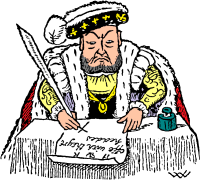HOME
Preface
Introduction
1
2
3
4
5
6
7
8
9
10
11
12
13
14
15
16
17
18
19
20
21
22
23
III
CHAPTER III.
CONCERNING ARMS.
E will now enter upon the component parts of Heraldry, and first of all we must say a few words upon Arms generally. As we have already explained that Coats of Arms were originally invented to distinguish individuals in battle, or, to use a homely phrase, to know t'other from which, it stands to reason that like all other coats they are of various kinds, and while some may be regarded as a kind of heraldic witney, others are only light armorial tweeds.
The varieties of Arms are ten : there are, it is true, several other kinds, such as arms of precision, (vide Snider, Martini-Henry, Mauser, &c., passim,) of chairs, of the sea, and of the human article; but these are not included in the heraldic list. Their names are as follows:--Arms of Dominion, Pretension, Concession, Community, Patronage, Family, Alliance, Adoption, Succession and Assumption.
Arms of Dominion are those borne by sovereign princes and states, and are annexed to the empires and kingdoms they possess. Thus, if the proprietor of the Isle of Dogs were to throw off his allegiance to the Queen, and to raise the flag of independence in the hope of making it a paving stone on the road to freedom, the Arms of the new canine kingdom would be a perfect example of Arms of Dominion. Apropos of Arms of Dominion, we may mention that the Eagles borne in the national arms of Russia, Germany, and formerly of Poland, are said to have originated in the standards which the Germans took from the Roman General, Varus, A,D. 10. Like some other conquering heroes, Varus went forth to shear the Teutons, and got his own hair cut remarkably close in the process; so close in fact, that he left his Eagles behind him, and the Germans considering them far superior as standards to those they had in use, which were doubtless a good deal knocked about, adopted them. At the same time, the
conquerors are said to have given one to each of their Sarmatian and Sclavonian allies, and hence the origin of the birds of prey in question.
Arms of Pretension may be regarded as a perfect instance of Heraldic impudence, which great kings, and little ones also when they get a chance, sometimes have the face to assume. These Arms are those of provinces, territories, or kingdoms, to which some claim is laid, and which the person so claiming adds to his own. That the territory in question may already have a man in possession, in the shape of a king or prince of its own, makes no difference, although of course he prevents, if he can, an execution for the claim being put in. These Arms can therefore only be borne by sovereigns and half-sovereigns; subjects, who represent human half-crowns, shillings, sixpences, and even smaller coin, are incapable of bearing them. For instance, if Bodgers of Brompton, who claims a seat on the half-past nine o'clock omnibus, finds a stranger in his place, his taking the arms of the intruder, except for the purpose of ejecting him, would not hold good in Heraldry.
Arms of Concession are marks of honour for deeds done. They are generally small figures added to the sum total of the Coat of Arms. To illustrate this we will imagine that a favourite puppy of the Prince of Wales were to break his leg, and that the fracture were to be instantaneously reduced by a single application of Professor Swallerway's world-renowned ointment, it is probable that the same eminent mediciner would be allowed to assume a "duck quackant," or some other appropriate emblem of the esteem of his Royal Highness.
Arms of Community are those belonging to bishoprics, cities, universities, companies, and bodies corporate. Bodies incorporate are of course without Arms, so that Polytechnic ghosts, and the whole army of spirits called up by mediums, have no right to assume them.
Arms of Patronage are added by governors of provinces, lords of manors, patrons of benefices, and others, to their family Arms, as a token of their superiority, rights and jurisdiction. But this is not always the case. For instance, our own private Buttons, who is lord of several manners,--that towards ourselves, of whom he stands in awe; and that towards boys of his own size, or smaller, of whom he does not stand in fear,--would not on that account have the right to assume Arms of Patronage.
Arms of Family, or Paternal Arms, are those which belong to one particular family, and are handed down from father to son with the hereditary acres and the paternal gout. These serve to distinguish the family from any other, and it is criminal for anyone, not of the family, to assume them. Thus, if Miss Jones goes out walking arm in arm with Mr. Smith, while Mrs. S. is down at Margate with the children, this assumption of arms is clearly illegal, as she, Miss J., does not, and cannot, while Mrs. S. is alive, belong to the family.
Arms of Alliance are only acquired by marriage, and more especially when that interesting event takes place with an heiress. But as, now-a-days, girls with money are gradually becoming scarcer, and it is much feared by the Zoological Society and other learned bodies, will soon be as extinct as the Dodo, or the Megatherium, Arms of Alliance are now but seldom used.
Arms of Adoption are those adopted by a stranger in blood, to fulfil the will of a testator. As a general rule, an estate accompanies this assumption, which may in fact be regarded as a golden lining to the coat the legatee is expected to put on.
Arms of Succession are acquired on succeeding to estates, either by will, entail, or donation. The assumption of this kind of Arms applies, however, only to estates, and not to gifts generally ; so that if Brown bestows a punch on the head upon Robinson, the latter is not entitled to take the arms, although he may previously have assumed the fist of Brown.
Last of all come Arms of Assumption, to which the assumers have no original title. These may only be assumed with the consent of the sovereign. Thus, the arms of a prisoner may be assumed by his captor: so that if Bill Sykes is caught making free with the plate basket of Joshua Toodles, vestryman and churchwarden, J. T. may, with the consent of Queen Victoria, take the jemmy of B. S. and transmit it to his heirs as the sign of the prowess he displayed in the defence of his spoons. Apropos of Arms of Assumption, assuming them in former times was rather a ticklish thing to do. This fact was brought home with great clearness to the Duke of Norfolk, and his son the Earl of Surrey, in the reign of Henry VIII. They assumed his arms, and he their heads. "Exchange is no robbery," said the monarch with a cheerful laugh, as he ordered their execution. But, somehow, the decapitated ones failed to appreciate the dry humour of the sovereign.
So very much depends upon the point of view from which jests are regarded, and Henry's jokes were not unfrequently of that exceedingly cutting nature--that the recipients, when, to add to their other misfortunes, they happened to be his wives, may be said to have quite lost their heads.
Thus much for ARMS.
III
1
2
3
4
5
6
7
8
9
10
11
12
13
14
15
16
17
18
19
20
21
22
23
Preface
Introduction
HOME
Build: 2019/04/20 14:20:08.59+0900(JST)



